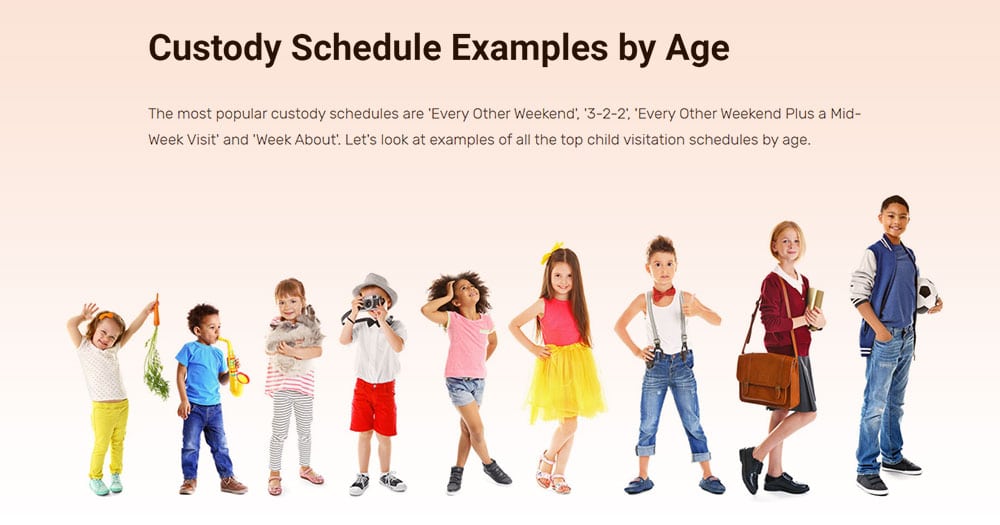With a little imagination, you should be able to come up with an age-appropriate custody schedule for your child or children. Just as children grow, visitation schedules should adapt over time. According to sensible visitation guidelines, a maturing child is best served by gradually longer stays with each parent.
Toddler vs Teen Coparenting Contrast

The potential benefit from customizing a custody schedule to the changing needs of a child is quite obvious if you compare the ideal schedule for a toddler with that for a teenager. The stark difference in optimal schedules shows that age really does matter.
An extensive list of custody schedules by age is illustrated and discussed at timtab.com. For pre-school children, the ideal schedule typically limits time away from the primary carer to no more than one night. For example, where parents live quite close to each other, the recommended schedule may involve anywhere up to 6 single-night visits per fortnight with the non-primary carer.
For a teenager, on the other hand, visits are ideally less frequent but longer. Generally, the recommended schedule has the teen spending one whole weekend from Friday afternoon through to Monday morning with each parent per fortnight. Any other visits with a parent during the week are for at least two nights.
Parent-Child Attachments Are More Delicate for Younger Children

Nurturing attachment is especially important for young children as they learn to orient the world. A very young child is considered to be “attached” if he or she tends to seek closeness to and contact with a particular caregiver, such as when the child feels distressed in any way or tired.
Attachment to a regular caregiver helps young ones to regulate their emotions. They are better able to cope with negative emotions and are bolder when exploring new environments. According to Dr Marinus van IJzendoorn, “Human beings are born with the innate bias to become attached to a protective caregiver… Sensitive or insensitive parenting plays a key role in the emergence of secure or insecure attachments.”
For an infant or toddler, 24 hours away from their primary caregiver would probably seem like a long time. A full weekend could feel like an eternity. An age-inappropriate custody schedule therefore has the potential to impede the child’s ability to properly attach to one or both parents.
That’s why the best custody schedules for pre-schoolers have short turnaround times. Children are never away from the primary carer for more than 24 hours or so. And, if the parents live reasonably close to one another, the child can be scheduled to see both parents multiple times during each week.
Older Children Should be Allowed to Settle When Visiting

What makes for a good visitation schedule changes as children become more independent and can easily handle time away from their mother or father. Frequent moves between homes offers few advantages and becomes unnecessarily disruptive. Older children prefer to stay at each home at least for a couple of days or so before having to pack up their stuff again and switch over.
Travel costs become a bigger consideration for teenagers as far as choosing the perfect schedule. If both parents live close to school, one of the most popular schedules is 3-2-2. The child spends three nights on the weekend with one parent before alternating two consecutive overnights with either parent during the week. With alternating blocks of time, the schedule is 50/50 and perfectly symmetrical.
But it one parent lives much closer to school than the other, 50/50 schedules make less sense. Instead of facing many long morning and afternoon commutes, a teen can be based at one parent’s home during the week and mainly see the more distant parent on weekends. This might correspond with a 60/40 or 70/30 custody schedule for example.
Missing a few nights with a parent during the week is not a big deal given how busy many teens are anyway. As well, older children have the ability to easily stay in touch with each parent using a mobile phone.
Explore the Range of Schedules Available

To find the ideal custody schedule, be prepared to do a little work. Family lawyers and many websites seem to default to schedules that are easy to explain but which may not work well, such as week about or alternating weekends. But the truth is that there are usually better alternatives to every other weekend, every other weekend plus a midweek visit, etc.
As mentioned earlier, timtab.com shows many different custody schedules by age. You can also use their software to generate your own custom schedule. The technology accounts for child ages as well as logistical factors such as school travel times. With some thought and a little effort, you may be able to come up with a schedule that has your child or children swapping homes at exactly the right times.
At What Age Can a Baby Stay Overnight with Father?
The suitability of a baby staying overnight with their father varies based on different factors. However, it is generally not recommended in the early weeks of life when it’s important for babies to stay near their mother for breastfeeding and close care.
As a basic rule-of-thumb, from about nine months on is when a baby could comfortably handle spending nights away from a primary carer, typically assumed to be their mother. An important caveat is the baby needs to also be attached to their father for this arrangement to not cause significant distress. Any overnight visits should also be kept short initially, from the evening until the next morning.
At 9 months, babies typically are mobile, crawling, and able to stand with support. They respond to their name, enjoy cuddling, and may show shyness or fear of strangers. They engage in games like peek-a-boo and pat-a-cake. (Source: UNICEF)
I am personally aware of a case when a baby had disrupted care with their mother from six to nine months of age and lived with her father, visiting with her mother during the day only at psychiatric facilities. The baby formed a very close attachment to her father and protested at being separated from him. She still displayed signs of distress at 18 months whenever there was a care changeover from the father to the mother.
Essentially, it all depends on the baby, the parents, and the circumstances. Children can cope well with different carers, which is evident from many young babies handling long daycare arrangements well. However, an overnight stay is quite a long time from the perspective of a baby. They need to feel secure and content in the care of their father for this to be a beneficial arrangement.


Diane
We’re trying to figure out a schedule that works for both of us and it’s next to impossible.. We have extended family to take into account as well – since both our families live close to us – which makes this even harder.
Mason Paulson
Just another reminder of the complexities of visitation. I’m no child-rearing expert but this shows the many details involved in figuring out a good visitation schedule that is fair for the parents, but more importantly, is best for the child.
Harrison Lang
Diane brings up a good point. That must be very difficult trying to get access for family members like grandma and grandpa. The children may be in high demand but as this article points out so well, you have to consider the child’s age and situation when creating a visitation schedule that fits the best needs of the child. That’s difficult for a parent or guardian with visitation rights because we know some custodial parents will use any excuse to deny access.
Connor Keith
Could anyone share their experiences on how to set up an appropriate visitation schedule when you have kids from wildly different age ranges? For example, we know it’s usually good to keep the little ones with their primary parent/caregiver for as long as possible but what if you have kids aged 4, 10, 12, and 14? Do you keep the 4 year old away from their siblings if they have a weekend visit?